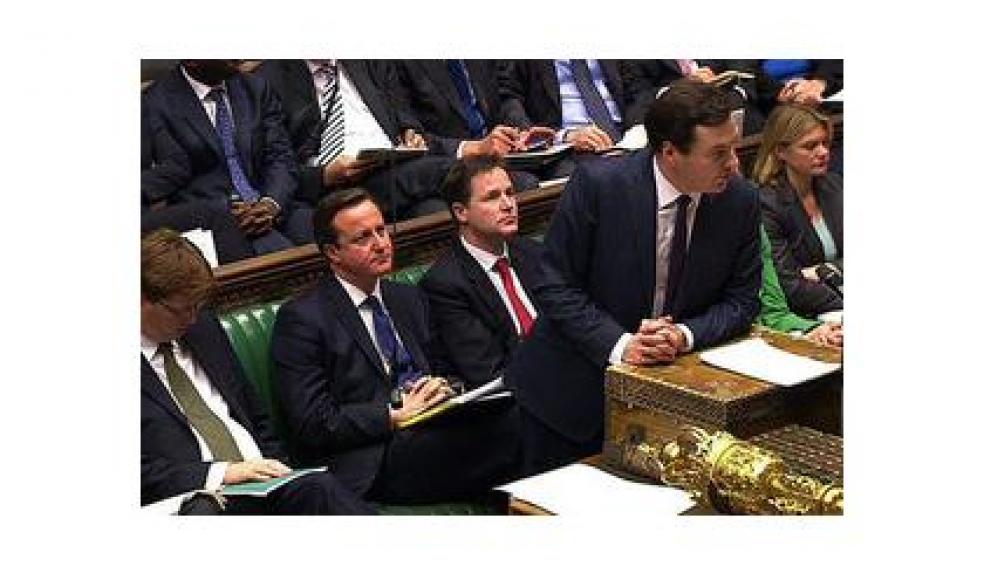
Lower business rates and cap on welfare in Autumn statement
In the Autumn Statement today, George Osborne has revealed that the UK economy is growing but the job of recovery was “not yet done”.
The chancellor said growth is "significantly more than forecast" with expected growth more than doubling from 0.6% to 1.4%.
The independent Office for Budget Responsibility (OBR) predicts that with growth at current levels the country will no longer be in debt by 2018-2019.
Osborne also warned of further cuts to service and acknowledged the affect to families: "The hard work of the British people is paying off and we will not squander their efforts."
He confirmed a sooner than expected rise to the state pension age introducing a measure which "keeps tracks with life expectancy" with the minimum age rising to 68 in the mid-2030s and 69 in the 2040s.
There will be a further £3bn of cuts from Government departments across the next three years.
The chancellor also announced that a cap on total government welfare spending will start next year, rather than in 2015.
He said the limit on total welfare spending would be set by the at the beginng of each parliament and if the limit was breached, the chancellor would have to explain why, and a vote would be held in the House of Commons.
Mr Osborne explained that some benefits such as Jobseekers' Allowance, would be excluded from this cap.
"All other benefits, from tax credits to income support, to the vast majority of housing benefit, will be included in the cap," he told MPs.
In 2014, the government is expected to spend £112bn on welfare payments, rising to £117.9bn in 2016.
The chancellor also announced plans to cap business rate increases in England and Wales to 2% next year, in a range of efforts to boost High Streets.
The plans include making it easier for businesses to move into empty properties and setting up of further funding for enterprise initiatives which help start up businesses.
There will also be an extra £1bn of cuts from the budgets of government departments for each of the next three years.
There will also be a£365bn investment to the UK's infrastructure to projects in energy, transport and communications.
Ahead of today's Autumn Statement announcement, the Royal Institute of Chartered surveyors (RICS) called on George Osborne to spell out a clearer plan for the nation’s infrastructure priorities. Priority should be given to projects that can deliver the greatest economic benefit, rather than providing immediate funding to those that just happen to be ‘next in the queue’.
Jeremy Blackburn, RICS UK Head of Policy, commented: “Good quality infrastructure developments and maintenance projects can bring big economic benefits to the areas that they serve. While it’s good that the Government acknowledges this, at the moment, there is no prioritisation in terms of those that can bring about the greatest benefit.
“We would like to see this addressed and projects given the go-ahead based on their economic potential, not merely because they appear next in the infrastructure investment pipeline. While we are seeing green shoots across many of the nation’s local economies, there still remain significant areas of the country that could benefit from a property-led recovery.
“The commercial property sector also needs to be looked at. Legislation around business rates is still causing problems for the high street. What we require is regular revaluations to lower the burden on businesses and make the retail sector more attractive to investors.”
Also announced was a lifting of the cap on student numbers allowing universities to expand further if they want to.
The cap on numbers would be lifted a year later, he said, and the changes would be funded by the sale of more student debt to private companies.
The chancellor told MPs: "Next year we will provide 30,000 more student places - and the year after we will abolish the cap on student numbers altogether.
"Extra funding will be provided to science, technology, and engineering courses.
Other key measures include: scarpping of next years fuel duty rise, scrapping of paper car tax discs and selling off the government’s 40% stake in Eurostar.
The statement was criticised by labour’s shadow chancellor Ed Balls who said: “Surely we can do better than this, With this out-of-touch chancellor and prime minister, hardworking people are worse off under the Tories.
"Net lending to business is down £100bn compared to May 2010."
He also said that the government was behind on the cost of living crisis and that working people were behind on the bill.
Alison Seabeck, MP for Plymouth Moor View, has condemned the Chancellor's statement.
She said it is full of ‘smoke and mirrors’ and fails to address the cost of living crisis that is impacting the lives of thousands of her constituents. The Chancellor spoke of economic recovery and improved predictions for future growth, however this simply is not being felt by thousands of Plymouth families who are experiencing higher prices to heat their homes, stagnant wages and have a Chancellor who fails to stand up for them, and sides with the rich.
“You simply can’t trust this Chancellor. George Osborne promised that by 2015 the budget would be balanced, and now he is saying it won’t be balanced till 2019. Growth was always likely to happen because it is cyclical. The point is, and it was reinforced today, that this Tory recovery is the slowest for 100 years and it is directly because of their policy choices," she said.
"He says ‘we’re all in this together’ whilst he is refusing to take action to freeze energy bills. He is letting the energy companies off the hook, and paying for a £50 subsidy with tax payers money. All this will leave families facing a £70 hike in the cost of heating their home this winter.”
“He is cutting budgets to local councils and insisting they freeze their Council tax whilst expecting them to maintain services to the elderly, fix potholes, keep schools running and libraries open. He, of course, takes no blame when they simply cannot make this work – something has to give and it won’t be millionaires in their well insulated houses, it will be low paid families in solid walled properties in the south west.”











